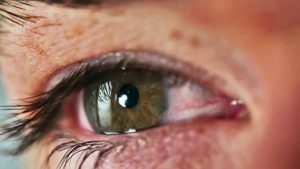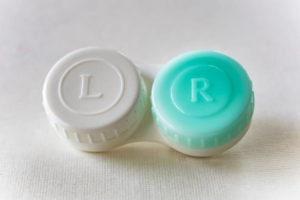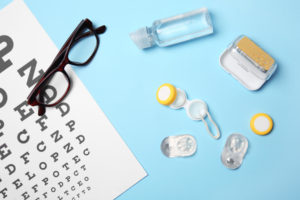We’ve all been there a time or two. You know that busy morning when you’re rushing around trying to get ready for work or whatever the day has in store for you; you lean over the sink and pry your eye open to put your last pair of new contacts in and suddenly, you drop one! You can’t see anything because only one eye has a good contact in it, but as you stand there with the most awkward looking wink on your face, the one thing you do manage to see is that new left contact sliding down into the drain. What do you do about it? You’ve probably not worn your glasses for a while and know that old glasses are a sure fire way to guarantee yourself a headache all day. The only option you’ve got is to grab an old contact from the case you took on vacation a month, or maybe six months back and hope that washing it off thoroughly might rid it of enough germs to be okay taking temporary occupancy in your eye. If you haven’t made an appointment with your optometrist in Houston TX, is it okay to wear old contacts?
As the day progresses, one contact is noticeably more comfortable than the other, and that question still pops into your head every time you blink a little harder in an attempt to “rehydrate” it because it feels like it’s adhering itself to your eyeball in the weirdest of ways. You can’t help but keep wondering if you’re putting your eye health at risk. And, you can almost hear the voice of your Houston optometrist telling you that this might not be healthy for your eyes.
Maybe your story is a bit different than this one, or you’ve just been putting off getting a contact lens exam. Whatever the case might be, the struggle is real when you’re down to your last pair of contacts, and if you’ve been wearing them beyond their expiration date, you can probably identify with at least one part of this scenario. Here are a few things you might need to know about wearing old contacts.
Keep The Oxygen Flowing To Your Eyes

Remember that described feeling of having your old contact lens feel like it’s adhering itself to your eye? This description isn’t too far off base because our contact lenses sit directly onto the eye and cover the whole cornea (in the case of some gas permeable contact lenses, the contact rests on only part of the cornea). Contact lenses tend to decrease the amount of oxygen that needs to reach your eyes from the environment around you. To keep eyes healthy, a good flow of oxygen is essential and your Houston optometry professional would agree.
There are ways to limit potentially harmful effects of oxygen deprivation from contact lens wear by doing the following:
- Make sure to listen and follow your eye doctor’s recommendations and discard and replace your contacts as directed.
- You might also look into selecting a more modern lens. Modern soft lenses are made of a special material that allows more oxygen to be transmitted through it more easily than some of the more conventional soft contact lens materials out there and in the long run, they might even be a safer option for your eyes.
- Another great lens option is rigid gas permeable (GP) contact lenses, I know what you’re thinking, “Rigid? Why would I want to put something “rigid” in my eye?” Don’t let the name fool you though! These contact lenses are also known as “Gas Permeable Contacts” and are a bit smaller in diameter than traditional soft or silicone hydrogel lenses and cover less of the corneal area. GP contacts also move around a fair bit with each blink, allowing your fresh tears to lubricant and move under the actual lenses.
Clean Your Contact Lenses And Case

Contact lenses already increase your risk of eye damage because of bacteria that can accumulate on them, but you double your risk when you don’t clean your contact lenses and case properly. This becomes a bigger problem as the lenses start to age and deposits begin to accumulate on both sides of the lenses.
To significantly reduce the risk of contact lens-related eye infections by properly cleaning and disinfecting your contacts after each use. Use only the contact lens solutions your eye doctor recommends, and don’t change brands without first consulting with your doctor.
Also, though most contact lens wearers use “no-rub” contact lens solutions, recent studies show these products can clean your lenses significantly better if you rub your lenses while rinsing them with the solution. (These one-step products are also called “multipurpose solutions,” because they contain ingredients that both clean and disinfect contact lenses.)
It’s also imperative to thoroughly rinse your contact lens storage case with fresh contact lens solution, then allow it to air dry before using. By letting the case to air dry, the risk of it getting contaminated with microorganisms that can damage your eyes is lessened. A good practice to get into is discarding your old case and replacing it with a new one at least every three months.
Remember that advice a few lines up about using a contact solution that your doctor recommends? This is just one last reminder to make sure that you only use fresh multipurpose solution every time you store your lenses in your contact lens case. It could be tempting to take the lazy way out and “top off” the solution that was already in your case from the day before, but be aware that doing this could put your eyes in danger. “Topping off” your solution decreases its effectiveness for disinfecting your lenses and could lead to contaminated lenses which ultimately ends up as a nasty eye infection. If you’ve been doing this and think you might have an infection, do a quick google search for “optometrist Houston tx”, or “optometrist nearby” to find a trained professional opthamologist in your area to book a contact lens exam quickly.
Follow Your Contact Lens Replacement Schedule

The best way to avoid over-wearing your contact lenses is to, make sure that you schedule regular appointments with your eye care professional to keep your prescription updated and you fully stocked with new contact lenses. Be sure to toss the old ones and replace them as recommended by your eye doctor.
A good thing to keep in mind is that although regarded as safe for use for many years, even if you care for your lenses as directed, normal lens deposits can still accumulate on your lenses over time. Remember that the longer you wait to replace your lenses, the more potential lens deposits have to reduce the much-needed oxygen supply to your precious corneas and could cause some real damage to your eyes.
Finally, get your, doctor directed, routine contact lens eye exams. Doing this puts you ahead of the issue before it becomes one. Your Precision eye doctors can catch any small problems before they become bigger issues, and your local opthamologist Houston tx, knows exactly what to do to help keep your eyes safe and healthy.


